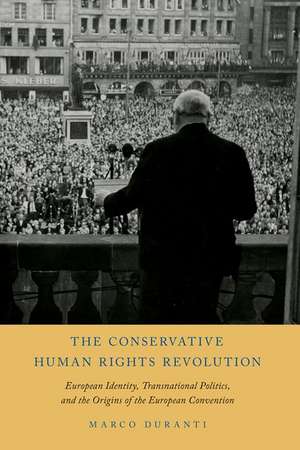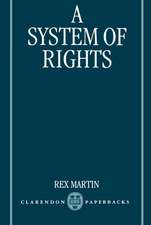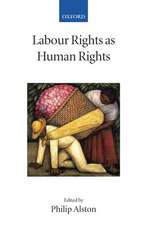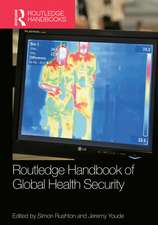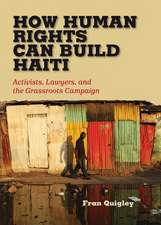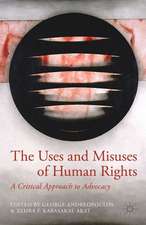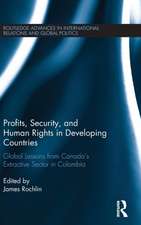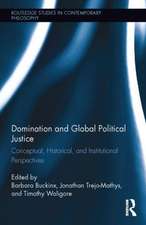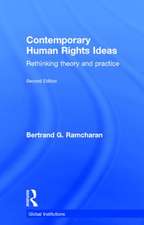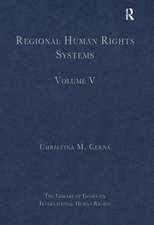The Conservative Human Rights Revolution: European Identity, Transnational Politics, and the Origins of the European Convention
Autor Marco Durantien Limba Engleză Paperback – 15 apr 2021
| Toate formatele și edițiile | Preț | Express |
|---|---|---|
| Paperback (1) | 331.71 lei 3-5 săpt. | |
| Oxford University Press – 15 apr 2021 | 331.71 lei 3-5 săpt. | |
| Hardback (1) | 662.18 lei 31-38 zile | |
| Oxford University Press – 23 feb 2017 | 662.18 lei 31-38 zile |
Preț: 331.71 lei
Nou
Puncte Express: 498
Preț estimativ în valută:
63.47€ • 67.87$ • 52.92£
63.47€ • 67.87$ • 52.92£
Carte disponibilă
Livrare economică 28 martie-11 aprilie
Preluare comenzi: 021 569.72.76
Specificații
ISBN-13: 9780197532348
ISBN-10: 0197532349
Pagini: 528
Dimensiuni: 155 x 231 x 31 mm
Greutate: 0.76 kg
Editura: Oxford University Press
Colecția OUP USA
Locul publicării:New York, United States
ISBN-10: 0197532349
Pagini: 528
Dimensiuni: 155 x 231 x 31 mm
Greutate: 0.76 kg
Editura: Oxford University Press
Colecția OUP USA
Locul publicării:New York, United States
Recenzii
This study reinterprets the origins of the European Convention on Human Rights (ECHR), arguing that conservatives conceived of the treaty not only as a means of containing communism and fascism in continental Europe, but also as a vehicle for pursuing a controversial domestic political agenda on either side of the Channel.
a must read for anyone working on the European Convention on Human Rights.
If there was any revolutionary turn in the history of human rights, argues Marco Duranti, it was both European and conservative in nature. The Conservative Human Rights Revolution, his monumental history of the birth of the European human rights system, reveals the strength of conservatism and reactionary thought in the late 1940s. . . . The "conservative human rights revolution" described in this difficult but masterful book enabled various right-wing political forces to shortly claim ownership on the European language of rights
Duranti's book is a must-read for those interested in the history of human rights, European integration and the relationship between international regulation and domestic politics. ... Duranti's book is, indeed, relevant to the politics of our time, but it is so precisely because it serves as a model for the tempered, rigorous and nuanced conversation we ought to be having on the longer and more complex history of the relationship between the ECHR and the politics of the Welfare State
A common narrative emphasizes that the European Convention on Human Rights of 1950 was based on the Universal Declaration of Human Rights of 1948 and went much further, because at the same time it established a mandatory human rights court, while the UN initially passed only a resolution. Duranti succeeds in making quite different starting points clear. ... A very welcome work, both methodologically and in terms of content.
In this substantial work, Marco Duranti argues that the establishment and propagation of "human rights" as a moral and political hallmark in post-Second World War western Europe was driven by a disparate assortment of mainly British and French conservatives. ... He has applied archaeological diligence to the investigation of many archives and indefatigably trawled the historiographic literature. He is revelatory on the roles of some lesser-known shapers of post-war western Europe: Marc; Maxwell-Fyfe; Duncan Sandys (Churchill's son-in-law); Louis Salleron; Pierre-Henri Teitgen; François de Menthon; Hélène de Suzannet; René Cassin; and others.
Duranti's book arrives at a potential turning point in Europe. It helps explain why many Britons were so invested in European integration and a distinctly European human rights project as well as highlights long-term ambivalence about both achievements. His work raises important questions about the strength of the foundations of these dual pillars of postwar Europe, suggesting that neither is as durable as they seemed.
The Panglossian account of the 1950 European Convention on Human Rights - that it was essentially uncontentious and genetically British - is the orthodox narrative that the Australian scholar Marco Duranti sets out to deconstruct. His copiously evidenced account, drawn from British, French, German, Italian, Dutch and US archives, is that the convention was an individualistic and conservative project, devised outside the offices of governments and the chambers of parliaments and designed to stem the postwar tide of socialism and statism.
Marco Duranti offers a refreshingly different and compelling narrative...It is a rich account, substantiated by an impressive amount of archival research.
The book is extremely well researched, and the writing is clear....Essential.
Marco Duranti's immense contribution is to get us to see that human rights cannot hover forever above history. His story of the origins of our human rights culture is as convincing as it is surprising. In questioning our assumptions about the European Convention on Human Rights, he pulls off that rare feat of getting us to think about what we know in a wholly fresh way.
Human rights history at its best. Duranti's well-written analysis of twentieth-century European internationalism is of lasting value. The insights into Euroskepticism that he provides could not be more timely. Necessary reading.
Marco Duranti's enthralling and meditative study of the origins of the European Convention on Human Rights is not merely a lesson in historical imagination, restoring Winston Churchill's role as the project's prime mover and detailing the importance of a fateful alliance of religious conservatives and free-market defenders in its origins. For The Conservative Human Rights Revolution appears at a moment when it is even more instructive and ironic, with the Tories Duranti shows were instrumental in the beginning in full revolt against their own creation. Students of the past and observers of the present will welcome Duranti's own creation with gratitude.
Required reading for anyone interested in the ideological foundations of the European Union.
In this masterful
Ground-breaking...radically new, thought-provoking
Marco Duranti has done outstanding work to present a nuanced picture of the origins of European integration...[T]he book is a must-read not only for historians of human rights, but also for those who are interested in the history of European conservatism and Christian Democracy as well as post-war European unification.
Duranti resolutely breaks with existing ideas about the emergence of Europe's greatest achievements: the European Convention on Human Rights (ECHR) and the European Court of Human Rights. In spite of the general opinion among historians, he shows that the European human rights project was mainly brought about by contributions from European conservatives, including French Catholics and British socialists.
A masterpiece in the area of the history of the European Convention on Human Rights.
Marco Duranti's powerful and provocative account...offers an analysis that is bound to be a key reference point in the field for years to come.
Duranti's book is highly recommended, and, in my view, deserves the accolades and great recognition which it will surely achieve. It should influence debates on how the ECHR is seen today.
Europe's integration and its broader postwar reconstruction, some scholars now claim, were conservative projects, geared toward bolstering traditional social, cultural, and economic hierarchies...The most ambitious and powerful study in this new wave of scholarship is Marco Duranti's The Conservative Human Rights Revolution. Duranti's sweeping political and institutional history reconstructs a transnational movement of conservative politicians and thinkers, who established the European Court of Human Rights (ECHR) in the aftermath of the Second World War.
a must read for anyone working on the European Convention on Human Rights.
If there was any revolutionary turn in the history of human rights, argues Marco Duranti, it was both European and conservative in nature. The Conservative Human Rights Revolution, his monumental history of the birth of the European human rights system, reveals the strength of conservatism and reactionary thought in the late 1940s. . . . The "conservative human rights revolution" described in this difficult but masterful book enabled various right-wing political forces to shortly claim ownership on the European language of rights
Duranti's book is a must-read for those interested in the history of human rights, European integration and the relationship between international regulation and domestic politics. ... Duranti's book is, indeed, relevant to the politics of our time, but it is so precisely because it serves as a model for the tempered, rigorous and nuanced conversation we ought to be having on the longer and more complex history of the relationship between the ECHR and the politics of the Welfare State
A common narrative emphasizes that the European Convention on Human Rights of 1950 was based on the Universal Declaration of Human Rights of 1948 and went much further, because at the same time it established a mandatory human rights court, while the UN initially passed only a resolution. Duranti succeeds in making quite different starting points clear. ... A very welcome work, both methodologically and in terms of content.
In this substantial work, Marco Duranti argues that the establishment and propagation of "human rights" as a moral and political hallmark in post-Second World War western Europe was driven by a disparate assortment of mainly British and French conservatives. ... He has applied archaeological diligence to the investigation of many archives and indefatigably trawled the historiographic literature. He is revelatory on the roles of some lesser-known shapers of post-war western Europe: Marc; Maxwell-Fyfe; Duncan Sandys (Churchill's son-in-law); Louis Salleron; Pierre-Henri Teitgen; François de Menthon; Hélène de Suzannet; René Cassin; and others.
Duranti's book arrives at a potential turning point in Europe. It helps explain why many Britons were so invested in European integration and a distinctly European human rights project as well as highlights long-term ambivalence about both achievements. His work raises important questions about the strength of the foundations of these dual pillars of postwar Europe, suggesting that neither is as durable as they seemed.
The Panglossian account of the 1950 European Convention on Human Rights - that it was essentially uncontentious and genetically British - is the orthodox narrative that the Australian scholar Marco Duranti sets out to deconstruct. His copiously evidenced account, drawn from British, French, German, Italian, Dutch and US archives, is that the convention was an individualistic and conservative project, devised outside the offices of governments and the chambers of parliaments and designed to stem the postwar tide of socialism and statism.
Marco Duranti offers a refreshingly different and compelling narrative...It is a rich account, substantiated by an impressive amount of archival research.
The book is extremely well researched, and the writing is clear....Essential.
Marco Duranti's immense contribution is to get us to see that human rights cannot hover forever above history. His story of the origins of our human rights culture is as convincing as it is surprising. In questioning our assumptions about the European Convention on Human Rights, he pulls off that rare feat of getting us to think about what we know in a wholly fresh way.
Human rights history at its best. Duranti's well-written analysis of twentieth-century European internationalism is of lasting value. The insights into Euroskepticism that he provides could not be more timely. Necessary reading.
Marco Duranti's enthralling and meditative study of the origins of the European Convention on Human Rights is not merely a lesson in historical imagination, restoring Winston Churchill's role as the project's prime mover and detailing the importance of a fateful alliance of religious conservatives and free-market defenders in its origins. For The Conservative Human Rights Revolution appears at a moment when it is even more instructive and ironic, with the Tories Duranti shows were instrumental in the beginning in full revolt against their own creation. Students of the past and observers of the present will welcome Duranti's own creation with gratitude.
Required reading for anyone interested in the ideological foundations of the European Union.
In this masterful
Ground-breaking...radically new, thought-provoking
Marco Duranti has done outstanding work to present a nuanced picture of the origins of European integration...[T]he book is a must-read not only for historians of human rights, but also for those who are interested in the history of European conservatism and Christian Democracy as well as post-war European unification.
Duranti resolutely breaks with existing ideas about the emergence of Europe's greatest achievements: the European Convention on Human Rights (ECHR) and the European Court of Human Rights. In spite of the general opinion among historians, he shows that the European human rights project was mainly brought about by contributions from European conservatives, including French Catholics and British socialists.
A masterpiece in the area of the history of the European Convention on Human Rights.
Marco Duranti's powerful and provocative account...offers an analysis that is bound to be a key reference point in the field for years to come.
Duranti's book is highly recommended, and, in my view, deserves the accolades and great recognition which it will surely achieve. It should influence debates on how the ECHR is seen today.
Europe's integration and its broader postwar reconstruction, some scholars now claim, were conservative projects, geared toward bolstering traditional social, cultural, and economic hierarchies...The most ambitious and powerful study in this new wave of scholarship is Marco Duranti's The Conservative Human Rights Revolution. Duranti's sweeping political and institutional history reconstructs a transnational movement of conservative politicians and thinkers, who established the European Court of Human Rights (ECHR) in the aftermath of the Second World War.
Notă biografică
Marco Duranti is Senior Lecturer in Modern European and International History at the University of Sydney. He has been a Fulbright Scholar at the European University Institute, a Fox Fellow at the Paris Institute of Political Studies, and a Postdoctoral Fellow in the Max Planck Research Group on History and Memory at the University of Konstanz.
